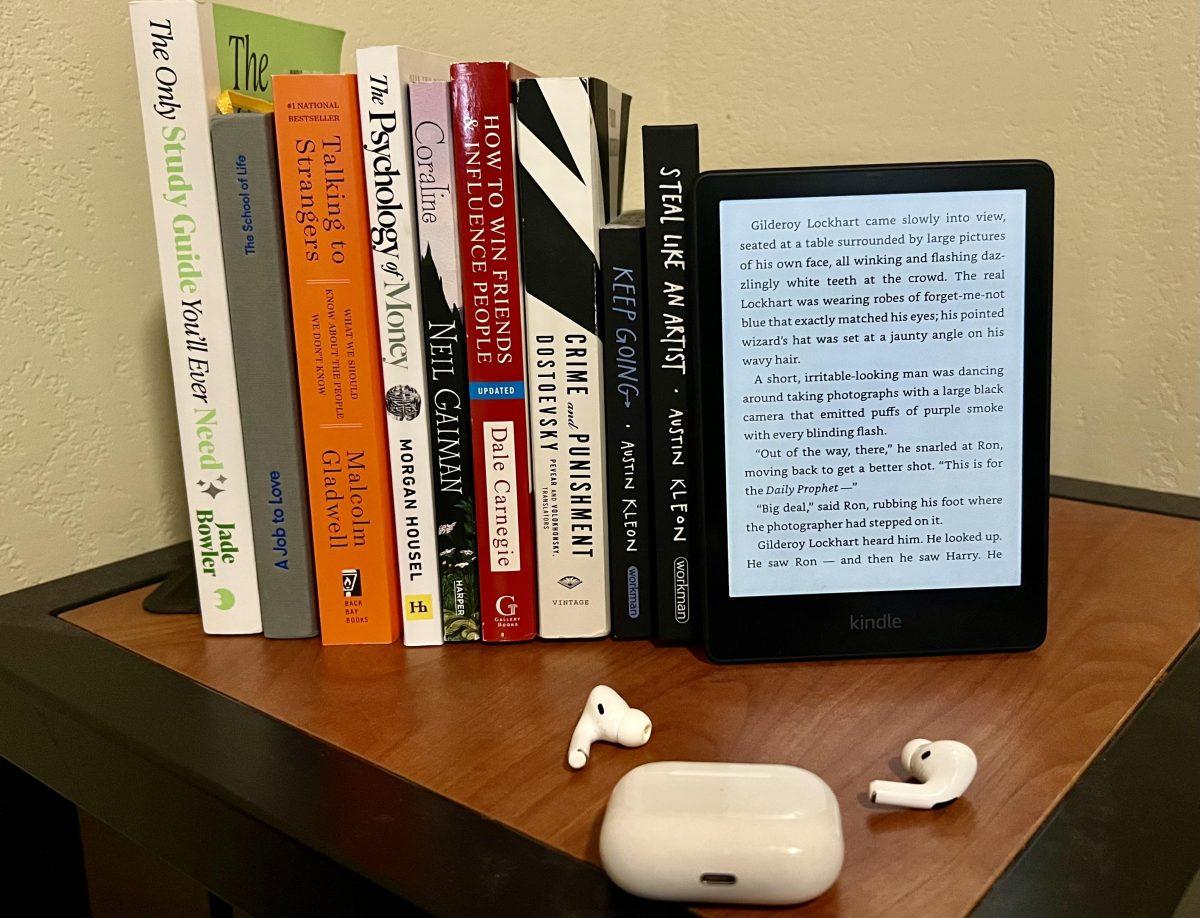New year, new habits. Trying reading?
Definitely a useful one; books can be one of the easiest ways to expand your ideas. But with classes, clubs and work starting up again, how can any regular Aggie build reading into their day-to-day life?
A system of course.
Three things changed the game for me: a product, service and habit.
Amazon Kindle📱
In physics, friction represents the resistance imposed on an object stuck between two surfaces.
Similarly, friction in habits represents the cognitive barrier of moving between two tasks: driving to the gym, finding ingredients for cooking or commuting to class in the rain. Friction is all the tiny details or efforts that cause us to second-guess a behavior. Reading is full of this.
A few things off the top of my head …
-
Finding a book to read.
-
Driving to the store — hope it’s in stock — and buying it.
-
Either only read at home, or be forced to carry it around in a bag.
-
Oh, and you can only start reading with decent lighting.
The Kindle simplifies reading; browse the store to pay and start reading any book, carry around an endless virtual library with a tablet thinner than your iPhone and enjoy a distraction-free experience in any lighting with its backlight. I swear this isn’t sponsored.
But seriously, these conveniences will let you morph books into any part of your day. In my schedule, I read every night before bed; replacing my last hour awake with a Kindle instead of my phone. I’ve drastically increased my pages and sleeping hours per week.
For you, it could be right before work, class or intramurals. Find those pockets in your day where you inevitably wander onto social media.
Audible🎧
This service will easily double your reading hours; all you have to do is take advantage of habit stacking.
“One of the best ways to build a new habit is to identify a current habit you already do each day and then stack your new behavior on top. This is called habit stacking.” — James Clear, Atomic Habits
Say you commute around campus for a total of an hour a day. Over the span of a school week, five days, you can accumulate five hours of reading through just audiobooks; time that otherwise would have been spent mindlessly walking, biking or sitting. Since most books are around 10 hours, by simply going to class you could finish a novel every two weeks.
Honestly, audiobooks can be stacked onto any mindless chore in life; got an hour of traffic? A pile of dirty laundry to take care of? Bored at the Rec? No problem, turn up Harry Potter and let your mind wander.
This will also create the effect where you look forward to long drives, workouts and even cleaning; for me, it was transforming.
Don’t just read, engage✍️
“Your mind is for having ideas, not holding them.” – David Allen
If you are doing steps one and two above, you are probably engaging with tons of new literature every month.
With mass consumption though, comes a sort of information overload. It becomes easy to forget what you read and move on to the next story. I know this happened to me in the early days.
If you want to span through endless novels only to remember a quarter of them, be my guest. It’s certainly easy to say you “read” 100 books last year, yet only recall the names of 20.
But for those interested in retaining what they read, I have a simple remedy: engage with your books.
At Texas A&M, we store and refine information by taking exams. But in this system, all you have to do is create something or discuss what you read.
Here are some simple ways to engage:
-
Join a book club.
-
Write short summaries.
-
Create book notes.
Actively engaging with your opinions or lessons from a book allows your brain to refine the key ideas to keep; storing them in long-term memory.
Obviously, there are levels to this. If you want to simply remember a few key details, write a three-sentence summary of the novel or discuss your ideas with a friend. It sounds like a time waster, but believe me, this is more powerful than you think; the mind only needs a few moments of reflection to store information, and writing or speaking is often the best method.
But say you run across a life-changing book that is filled with useful knowledge; in that case, write notes. Highlight important bits and pieces, and then try to rephrase all the key points as if you were teaching the book to a stranger. Basically, create your own cliff notes.
I’ll warn you though, this method is very time-consuming, but it will essentially burn the book into your brain’s flash drive. So only do this for the really worthy ones.
My system summarized: Kindle + audiobooks + engagement = highly effective reading habit.
Try it out. With this reading style, I’ve had the luxury of an eventful first semester while still being well-read.
Juan Lleras is a psychology sophomore at Texas A&M and submitted this piece as a guest commentary to The Battalion.



























